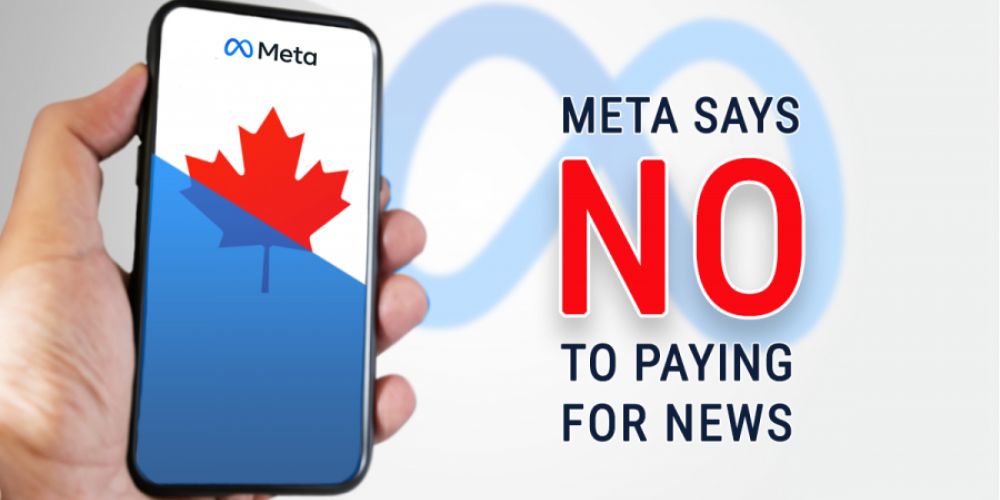
Meta to end news in Canada after Online News Act becomes law
AN HISTORIC SHIFT – AND ITS CONSEQUENCES
It’s no secret that traditional media outlets have struggled in recent years as tech firms – largely web and social media giants like Google and Meta – have taken over the advertising market. Consumer habits have moved online, and revenues that once flowed exclusively to traditional newspapers, magazines, TV and radio stations have shifted to digital platforms.
Along the way, tech platforms have been indexing, linking to, and cross-posting news content, then selling ads against the resulting traffic. Media platforms pay to create the content, while Big Tech benefits from it, all without paying anything back to those who produce it.
As waves of mass layoffs sweep across the media industry in both the U.S. and Canada, it’s clear this is not a terribly sustainable situation.
ENTER THE CANADIAN GOVERNMENT
To address the gap between Big Tech and Big Media, the Canadian government last year proposed a piece of legislation called Bill C-18. Also known as the Online News Act, it attempts to level the playing field by requiring tech firms to pay for using media developed content across their platforms.
The law creates a framework for individual tech firms to negotiate specific deals with individual media outlets/platforms. Rather than imposing a set rate for tech firms to pay, it establishes the rules by which they would negotiate fair arrangements with media outlets, then manage those relationships over time.
Bill C-18 was voted into law by the Canadian Senate earlier this month. Almost immediately, Meta, which has long campaigned against the legislation as potentially damaging to its business, announced it would remove news content from its Facebook and Instagram platforms before the new law takes effect.
Meta’s announcement shouldn’t come as a shock. The company has been rattling its sabers for months, essentially threatening to take its ball and go home if the government passed the bill into law.
Earlier this month, it announced it would be testing removal of news content for about 5% of its Canadian users. This pilot program was seen as a precursor to the content removal announcement, and a test of the company’s ability to implement large-scale blocking technology across the entire country.
GOOGLE PLAYS A SIMILAR TUNE
Meta isn’t alone, as Google has followed an almost parallel path to Meta. In March, the company implemented a similar large-scale news content blocking test, targeting approximately 4% of Canadians.
Both companies played hardball with the Australian government, as well, when the government Down Under enacted its own digital news law in 2021. Meta and Google both threatened to pull their services there until a last-minute deal allowed the law to proceed. Canada’s law used the Australian experience as a template, and digital platform operators there are now routinely negotiating payment terms to carry media content on their platforms.
Like Meta, Google has been vocal in its criticism of the Canadian law, saying concerns it raised about the law during earlier government hearings had not yet been addressed. Unlike Meta, however, Google said it was looking forward to working with the government to resolve any remaining gaps.
A TICKING TIME BOMB
Meta’s threat to pull media content could come back to haunt it. As the leading legacy social media player, it is grappling with the industry’s pivot to artificial intelligence (AI), its high-priced and fast-fading bet on the metaverse, and slowing growth in its core social media business.
More ominously, younger users are transitioning away from Facebook and toward fast-growing players like TikTok and Snapchat – and they’re taking their advertising dollars with them. Even Instagram is skewing older – and given its visual-first mission, isn’t really much of a news source, anyway.
JOCKEYING FOR POSITION
Within this broader context, Meta’s move likely isn’t final. While Bill C-18 has just become law, it’ll take about 6 months before Canadian regulators draft the day-to-day rules of engagement, enactment, enforcement. That gives the two sides time to keep negotiating toward an eventual resolution that keeps the news content flowing.
It is our view that Meta’s threat is intended less of a scorched-earth promise and more of an effort to optimize its negotiating position as the clock ticks down to enactment. It’s in the company’s best interest to ultimately back away from the precipice.
THE BOTTOM LINE
Whatever happens, the current near-standoff between Big Social and the Canadian government over the Online News Act opens up opportunities for nimble organizations and their developers to craft new tools, processes, and platforms to surface – and monetize – media content among large audiences.
Uncertainty so often breeds innovation, and this chapter is no different. This isn’t an ending, and news isn’t about to go dark across Facebook, Instagram, and other social media platforms. Rather, the flurry of activity around the new law serves more as a signal that the status quo is no longer sustainable, and it’s up to a new generation of tech-first creators to figure out a new path forward.
Ultimately, we may all yet realize that surfacing and discovering news content via social media was – and is – a relatively inefficient means of consumption that’s best left behind as consumers transition away from a social-media-first existence.
Against that backdrop, Meta may have just signed its own death warrant. And opportunistic developers may have stumbled on their next best opportunity.
Want to learn more? Contact us.


